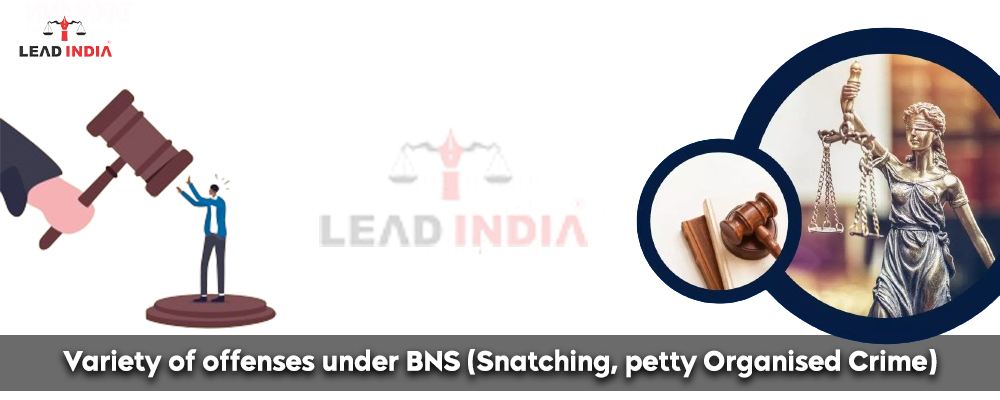The Bharatiya Nyaya Sanhita retains Most of the IPC’s crimes. It includes community service as a type of punishment. Sedition is no longer considered an offense. Instead, a new felony has been formed for acts that threaten India’s sovereignty, unity, and integrity. Terrorism is now included as a crime under the BNS. It is described as an act that seeks to endanger the country’s unity, integrity, and security, intimidate the general public, or disrupt public order. Organized crime has been included as an offense. It includes crimes, including kidnapping, extortion, and cybercrime, done on behalf of a criminal organization Petty organized crime is now punishable as well.
Need A Legal Advice
The internet is not a lawyer and neither are you. Talk to a real lawyer about your legal issue

Variety of offenses under BNS
- Offences against the body: The IPC makes murder, aiding suicide, assault, and causing serious bodily harm illegal. These provisions are retained by the BNS. It introduces new offenses such as organized crime, terrorism, and murder or serious bodily harm by a gang for specific reasons.
- Sexual offenses against women: These are criminalized under the IPC, including rape, voyeurism, stalking, and insulting a woman’s modesty. These provisions are retained by the BNS. It raises the age requirement for the victim to be classified as a major in the instance of gang rape from 16 to 18 years. It also makes sexual intercourse with a woman illegal if done deceptively or with false promises.
- Sedition: The BNS abolishes the charge of sedition. It instead punishes the following: (i) inciting or attempting to incite secession, armed revolt, or subversive acts, (ii) fostering separatist sentiments, or (iii) jeopardizing India’s sovereignty, unity, and integrity. These offenses may involve the interchange of words or signs, computer communication, or the use of financial resources.
- Terrorism: It is defined by the BNS as an act intended to: (i) harm the country’s unity, integrity, and security; (ii) intimidate the general public; or (iii) disrupt public order. Punishment for trying or conducting terrorism includes: (i) death or life imprisonment and a fine of Rs 10 lakh if the person dies, or (ii) imprisonment for five years to life and a fine of at least five lakh rupees.
- Organized crime: These comprise crimes such as kidnapping, extortion, contract killing, land grabbing, financial schemes, and cybercrime committed on behalf of a crime syndicate. Attempting or perpetrating organized crime will be punishable by (i) death or life imprisonment and a fine of Rs 10 lakh, if a person is killed, or (ii) imprisonment for five years to life and a fine of at least five lakh rupees.
- Mob lynching: According to the BNS, murder or grave bodily harm committed by five or more people on certain grounds is an offense. These grounds may include race, caste, gender, language, or personal beliefs. Such murder carries a minimum sentence of seven years in jail, with the possibility of life imprisonment or death.
- Petty organized crime: These refer to individuals who perpetrate crimes as part of a group or gang, either individually or together. Petty organized crime refers to acts such as theft, snatching, cheating, unauthorized ticket sales, betting or gambling, and selling public exam question papers.
- Snatching: The term “snatching” will have the same meaning as defined in section 304(1) of the BNS, because section 3(2) of the BNS states that any expression explained in any part of the BNS shall be treated as used by such explanation in every other part of the BNS. However, if the criminal doing “snatching” (chain snatching, cell phone snatching, etc.) is a member of a gang or organization, the crime of snatching is penalized under this clause. If he commits it as a lone wolf (acting alone and not as part of a gang or group), he shall be punished under Section 304(2) [Section 304 is a new section that treats snatching as a separate new offense]. Section 304(2) imposes a lower punishment than Section 112.
Lead India provides free legal advice, internet information, and other legal services. We offer a forum where you may talk with a lawyer and ask legal questions. Lead India’s Lawyers may assist you with any legal matters. Lead India’s solicitors can help you with any legal concerns. Lead India also offers free online legal help in India. In addition to providing online legal aid, Lead India allows users to ask specialist inquiries for free.





 Talk to a Lawyer
Talk to a Lawyer